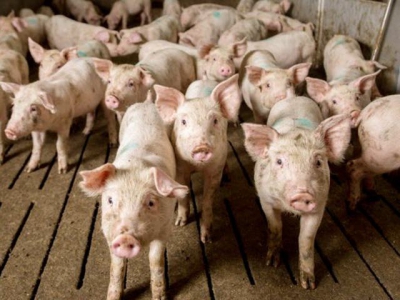Bacteria implicated in gastric ulcer development in pigs

Study identifies new bacterial species implicated in ulcer development and opens way for new control methods.
Gastric ulcers are common in pigs, but until recently, the cause of this disease was unclear, according to researchers at the Ghent University in Belgium.
The researchers recently published a thesis that shows how two bacteria play a role in gastric ulcer development — one that was previously unknown — which paves the way for development of new methods to control the disease.
Gastric ulcers are a common problem in pigs worldwide. They cause pain, weight loss and sometimes even sudden death and clearly affect the welfare of the animal, the university said. Diet, stress and illness all may contribute to the development of gastric ulcers, but the exact cause of the disease is not yet known. Moreover, no treatment exists that fully protects pigs against the development of gastric ulcers.
According to the researchers, Helicobacter suis is a bacterium frequently found in the stomach of pigs. Until recently, it was not clear how this bacterium induced lesion development, they said, noting that their results show that H. suis affects gastric acid secretion.
The effect depends on the age of the pigs. For example, in six-month old pigs, acid secretion was inhibited, which paved the way for Fusobacterium gastrosuis, a new bacterium that was discovered during this doctoral research. The researchers suggested that F. gastrosuis may kill cells of the stomach wall.
In adult pigs, the acid secretion again was increased, but at that point, it may make the already existing damage more severe.
According to Ghent, the results of this thesis show that the concerted action of the two bacteria, H. suis and F. gastrosuis, play a role in the development of gastric ulcers in pigs. Further studies on both bacteria are necessary in order to develop new control measures for this disease, the researchers said.
The thesis research was supported by professors Freddy Haesebrouck and Richard Ducatelle in the Ghent University Faculty of Veterinary Medicine.
Có thể bạn quan tâm
Phần mềm

Phối trộn thức ăn chăn nuôi

Pha dung dịch thủy canh

Định mức cho tôm ăn

Phối trộn phân bón NPK

Xác định tỷ lệ tôm sống

Chuyển đổi đơn vị phân bón

Xác định công suất sục khí

Chuyển đổi đơn vị tôm

Tính diện tích nhà kính

Tính thể tích ao hồ



 Just how much do we know about taste…
Just how much do we know about taste…  New feed fermentation method developed
New feed fermentation method developed